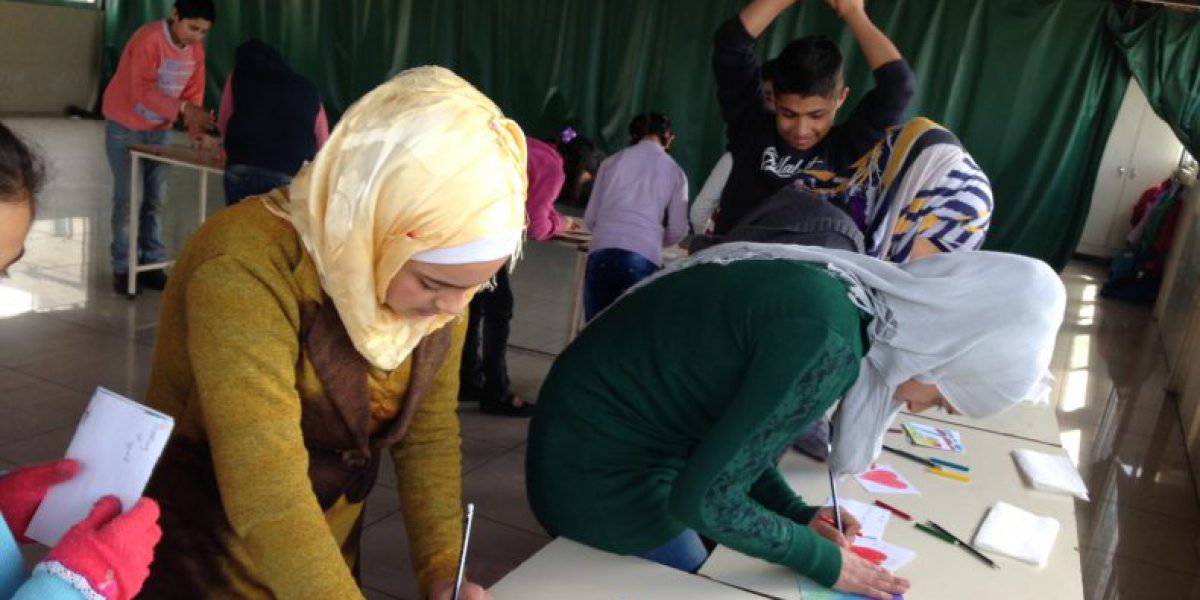Canada: Creating Communities
10 January 2018|Norbert Piché Canada Country Director & Mario Brisson SJ, JRS Canada

Following the call in 1980 of Pedro Arrupe SJ, then Superior General of the Society of Jesus, to assist the Vietnamese boat people, the Jesuits of French Canada started to sponsor refugees. Canada had instituted the private sponsorship of refugees in 1979. Since then, the Jesuits’ sponsorship program has supported thousands of forcibly displaced people from many parts of the world.
The program is relatively simple: the first component is for residents of Québec who wish to bring family members to Canada, but do not qualify financially under the government criteria, to be sponsors: they come to us, and we act as guarantors. We do all the administrative work of filling out the government forms and make sure the newcomers, as they prefer to be called, have all the necessary documentation. Once the application is approved, there is a waiting period that is usually between two to five years before the newcomers can arrive.
The second component is for groups, usually parishes, who wish to sponsor a family of newcomers. They have the financial means to be sponsors, and therefore do not require us as guarantors; however, they do depend on us for our administrative expertise.
Upon arrival of the newcomers, we assist the sponsors (both family members or groups) in the integration process. This means meeting them at the airport; helping them with more administrative work (there are many forms to fill out once the newcomers arrive, such as application forms for their health cards, social insurance numbers, etc.); accompanying them during their transition to a new culture and language; helping those who suffer from psychological trauma; supporting them in their job search; supporting them financially with their basic needs; and orienting them to their new city—with the public transportation system, libraries, recreation centers, schools, etc.
In 2016, Canada welcomed over 45,000 refugees, primarily from Syria, numbers not seen since the Vietnamese and Bosnian crises. We are experiencing something quite exceptional, and listening to both the newcomers and sponsors is essential in addressing everyone’s needs. What is certain is the importance of being present to the people whom we welcome, so that we better understand what they feel and experience at the level of their personnel development.
Realizing that the sponsors could not respond to the growing numbers and needs of the newcomers, we put in place a special, holistic project that allows us to look at all the different aspects of the newcomer—psychosocial, physical, intellectual, and spiritual.
Supported by a group of 25 experienced volunteers and two employees, the project targets three important aspects of the newcomer’s life in Canada: accompaniment in their psychosocial and spiritual needs, their integration into community life, and their acquisition of the French language. We try to accomplish this, as much as possible, in the communities where the newcomers live.
In the psychosocial and spiritual section, we offer support to individuals and families who are mourning both the loss of relatives, friends, their livelihood, their country, etc., and their challenges in the resettlement process. To accomplish this, we offer them different activities such as home visits, introductory sessions on life in Canada, and workshops on the hardships one may encounter when forced to make the transition to a new home.
Home visits allow the newcomers to express their feelings: to voice their suffering, fears, stress, anxiety, anger, joy, gratitude, etc. This allows us to better respond to their needs by accompanying them to a medical clinic or to their children’s schools. We also accompany them in follow-ups for all applications, research on professional training needs, professional equivalency, or adult education. Most importantly, the visits cultivate a relationship of confidence with the newcomers. In fact, they have requested our help in overcoming family problems.
It is also through home visits that we discovered the parents’ needs for assistance with their children’s homework and to better understand the educational system. An essential element of these visits is the opportunity to socialize with the entire family. Here are some of the words from the parents and the children:
“I cannot find the words to express my feelings when he stayed until 11 p.m. to help my son with an exam the following day.”
(Mother of two teenagers)
“In the beginning, I was a bit afraid because of the color of her skin, but now I don’t want her to go back to her country.”
(An eight-year-old girl speaking about an African volunteer who tutored her).
“He helped me build confidence in myself.”
(A 16-year-old)
Our information sessions have introduced newcomers to Canadian culture, specifically in Québec. They find out about affordable, available resources that they can use, and if there is something we cannot provide, we also inform them about other organizations with whom we collaborate.
In partnership with a school division, we have developed French conversational classes run by a teacher and/or volunteer. Being less formal, these classes allow the newcomers to express themselves in the context of everyday life. During these classes, other volunteers look after the children.
A vital part of our programs is a workshop on the hardships of leaving their home and arriving in a new society. This is a chance for the newcomers to have a voice and a space to express themselves freely about their feelings. Too often, those feelings are never dealt with because of the rush to integrate (learning the language, finding a job, etc.). In these workshops, they are given time and much needed space.
During these days of sharing, both young adults and their parents: meditate, recount stories, sing, play, and eat. They fully experience their new life together.


